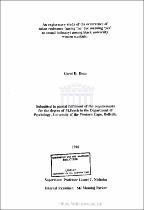| dc.description.abstract | The literature reports that some women engage in token resistance to sexual intimacy in heterosexual relationships. Although this concept has not been fully explored in South Africa it is a controversial issue which has shed light on the understanding of heterosexual relations. Token resistance intimates saying 'no' but meaning 'yes' to physical and sexual intimacy. Token resistance impacts on the feminist position
which supports women by demanding that women need to be taken seriously and therefore when they say'no' it means 'no"'. This has direct consequences for how feminists construe communication, and for the communication styles in heterosexual relationships. It may also have an impact on how women feel about themselves and how men perceive women, as well as have a negative influence for the development
of open and honest relationships. In addition, it raises great concern for women's safety with regard to abuse and rape. This study explores the occurrence of token resistance in 42 black university women students at the University of the Western Cape. It primarily adopts Muehlenhard and Hollabaugh's (1988) theoretical system which identified three main categories with sub-themes, Inhibition-Related, Practical and Manipulative reasons to account for the utilisation of token resistance. This thesis attempts to contextualise the occurrence
of token resistance by examining the role of the sexual double standard, women's socialisation and ideological influences on women's sexuality. The findings reveal and confirm the hypotheses that black women use token resistance to negotiate sexual intimacy in heterosexual relationships, for Practical, Inhibition-related, and Manipulative Reasons. The implications of the findings are twofold. On the one hand it speaks to the importance of the need for open communication in heterosexual relationships. It highlights the ideological sexual role that women play in society where they still struggle to directly assert their sexual needs, largely deferring the initiation of physical and sexual intimacy to men. This may be directly due to the exposure to and the internalisation of a sexist socialisation. On the other hand, it raises important questions about the function of token resistance and how it must at some level provide satisfaction of some needs, particularly in heterosexual relationships. Moreover it also draws attention to the complexity of communication and relating in various relationships, where communication does not occur only through clear and direct verbal articulation alone. | en_US |

